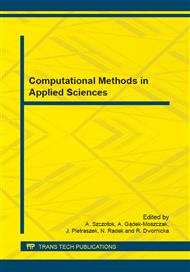p.17
p.23
p.29
p.37
p.43
p.49
p.55
p.63
p.69
The Modified Power Method for Solving the Eigenvalue Problem with the Use of Idempotent Matrix
Abstract:
The work presents a new approach to the power method serving the purpose of solving the eigenvalue problem of a matrix. Instead of calculating the eigenvector corresponding to the dominant eigenvalue from the formula , the idempotent matrix B associated with the given matrix A is calculated from the formula , where m stands for the method’s rate of convergence. The scaling coefficient ki is determined by the quotient of any norms of matrices Bi and or by the reciprocal of the Frobenius norm of matrix Bi. In the presented approach the condition for completing calculations has the form. Once the calculations are completed, the columns of matrix B are vectors parallel to the eigenvector corresponding to the dominant eigenvalue, which is calculated from the Rayleigh quotient. The new approach eliminates the necessity to use a starting vector, increases the rate of convergence and shortens the calculation time when compared to the classic method.
Info:
Periodical:
Pages:
43-48
DOI:
Citation:
Online since:
January 2015
Authors:
Price:
Сopyright:
© 2015 Trans Tech Publications Ltd. All Rights Reserved
Share:
Citation:


